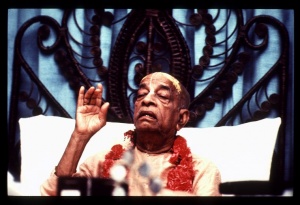CC Madhya 6.179

A.C. Bhaktivedanta Swami Prabhupada
TEXT 179
- āra ye ye-kichu kahe, sakala-i kalpanā
- svataḥ-pramāṇa veda-vākye kalpena lakṣaṇā
SYNONYMS
āra — except this; ye ye — whatever; kichu — something; kahe — says; sakala-i — all; kalpanā — imagination; svataḥ-pramāṇa — self-evident; veda-vākye — in the Vedic version; kalpena — he imagines; lakṣaṇā — an interpretation.
TRANSLATION
“If one tries to explain the Vedic literature in a different way, he is indulging in imagination. Any interpretation of the self-evident Vedic version is simply imaginary.
PURPORT
When a conditioned soul is purified, he is called a devotee. A devotee has his relationship only with the Supreme Personality of Godhead, and his only occupational duty is to execute devotional service to satisfy the Lord. This service is rendered through the Lord’s representative, the spiritual master: yasya deve parā bhaktir yathā deve tathā gurau [ŚU 6.23]. When the devotee executes devotional service properly, he attains the highest perfection of life—love of Godhead: sa vai puṁsāṁ paro dharmo yato bhaktir adhokṣaje (SB 1.2.6). The ultimate goal of understanding the Vedas is to be elevated to the platform of rendering loving service to the Lord. The Māyāvādī philosophers, however, consider the central point of relationship to be the impersonal Brahman, the function of the living entity to be the acquisition of knowledge of Brahman, resulting in detachment from material activity, and the ultimate goal of life to be liberation, or merging into the existence of the Supreme. All of this, however, is simply due to the imagination of the conditioned soul. It simply opposes him to material activities. One should always remember that all Vedic literatures are self-evident. No one is allowed to interpret the Vedic verses. If one does so, he indulges in imagination, and that has no value.